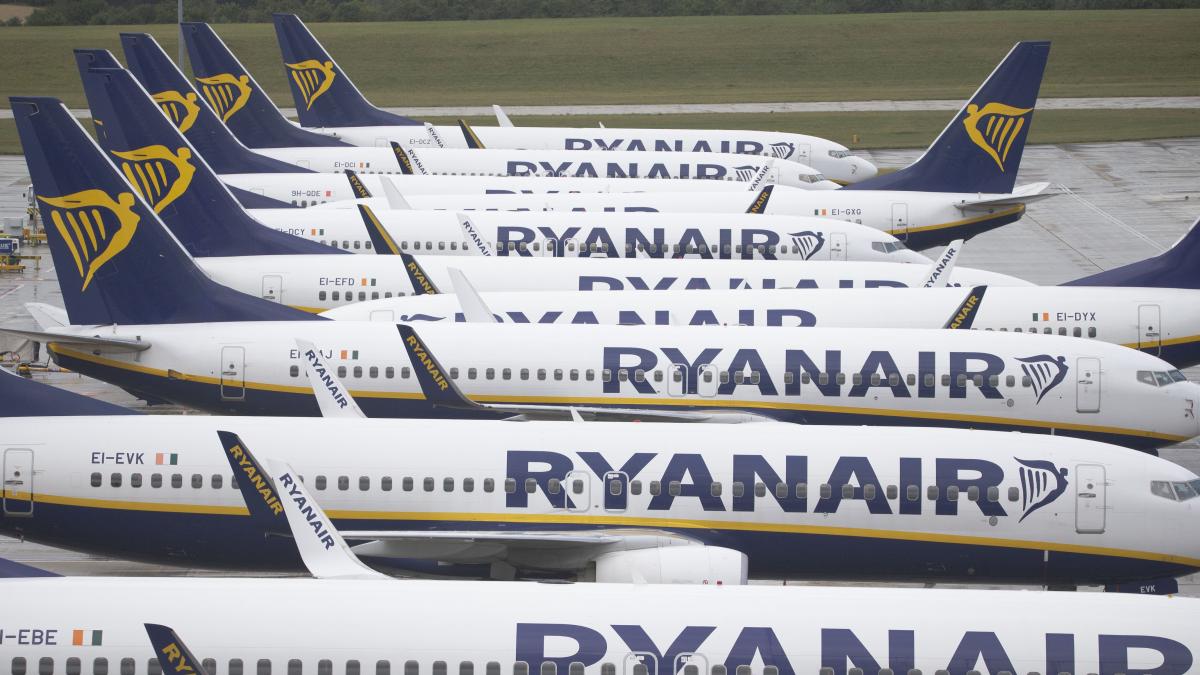Ryanair cabin crew will go on strike for six days at the start of the summer season. The USO and Sitcpla unions announced this Monday a call for a six-day strike set for June 24, 25, 26 and 30, as well as July 1 and 2.
USO (Unión Sindical Obrera or Labour Trade Union) and Sitcpla (Sindicato Independiente de Tripulantes de Cabina de Pasajeros de Líneas Aéreas; Independent Airline Passenger Cabin Crew Syndicate) are the unions representing a majority of airline crew staffing Ryanair in Spain
The workers have denounced having not been able to sign their first collective bargaining agreement with the airline, making clear that “Ryanair has forced this strike” meaning they are must be compelled to “comply with the application of basic labour rights and judicial sentences”, in an explanatory statement from the unions, this Monday, at a press conference in Madrid, where the union’s announced the mobilisations of their members.
 Representing approximately 1,200 cabin crew (known as TCP for Tripulante de Cabina de Pasajeros, or Passanger Cabin Crew) currently working at Ryanair, they had been negotiating their first collective agreement with the company for the last eight months, but say that the airline “has left the table” after reaching a separate agreement with the Workers Commission, the CCOO, the largest trade union in Spain “without consulting the company’s flight personnel” according to the USO after their announcement of the call to strike.
Representing approximately 1,200 cabin crew (known as TCP for Tripulante de Cabina de Pasajeros, or Passanger Cabin Crew) currently working at Ryanair, they had been negotiating their first collective agreement with the company for the last eight months, but say that the airline “has left the table” after reaching a separate agreement with the Workers Commission, the CCOO, the largest trade union in Spain “without consulting the company’s flight personnel” according to the USO after their announcement of the call to strike.
The general secretary of the USO section at Ryanair, Lidia Arasanz, pointed out that “Ryanair crew continue to be third party workers, our rights are still not respected.
Ryanair has forced this strike and we have to return to mobilisation so that the reality of our situation is known, so that Ryanair is forced to comply with the application of basic labour rights and court rulings, to achieve an agreement and some decent working conditions for the entire workforce. Ryanair is the only international company in our country without a collective agreement”
The union makes clear that Ryanair does not have any valid collective agreements in any of the countries where it operates. It has specific agreements in some countries such as Belgium, Italy or Portugal, but “they do not even comply”, said the USO in their condemnation of the airline’s practices.
“Ryanair has problems everywhere and with all groups of workers because it fails to comply with everything it signs,” they said, referring to conditions for the airline’s pilots who, in principle, will not join this strike.
More strikes are possible during the summer
The company has signed an agreement containing “precarious conditions” with the CCOO (Workers’ Commission) a majority union among many groups of workers in Spain, but not among Ryanair flight personnel or any airline, the combined unions declared.
This agreement includes points such as a salary increase of €1,000 euros in 2022 and €800 by 2023, but according to the USO this has already been included in court sentences passed in the Spanish National High Court that annulled salary cuts already applied “illegally” at the beginning of the pandemic.
The strikes are to take place across all ten bases in Spain (Madrid, Malaga, Barcelona, Alicante, Seville, Palma de Mallorca, Valencia, Girona, Santiago de Compostela and Ibiza) and will be for 24 hours on each of the indicated days. It is not yet known what the minimum services they will be forced to carry out are yet to be. And they do not rule out having to call more strikes this summer if the problem continues, both in Spain and in other European countries.
It must be taken into account that TCPs still do not have the right to their mandatory 22 working days of annual leave that all other workers in Spain have, nor the 14 days of national holidays. In other words, Ryanair still does not comply with basic Spanish labour legislation, criticised both unions, which also indicate that the company “hinders” access to the rights to reduce working hours for family care and that workers still do not receive their payroll in Spanish.
The association also reminds the airlines that a judgment in the Court of Justice of the European Union (CJEU) in April 2018 determined that a workers’ strike is not considered within the concept of “extraordinary circumstances” -which exempts from delivering the amounts- and so the company cannot deny the compensations that are demanded of them on the basis of industrial action.
Exceptions include the airline not having to provide such compensation if clients “are informed of the cancellation at least two weeks before the scheduled time of departure” and seven days before the scheduled time of departure are offered alternative transportation that allows them to depart no more than two hours before the scheduled time of departure and to arrive at their final destination less than four hours later with respect to the expected time of arrival.
In any case, FACUA also points out that those affected by possible cancellations will always have the right to a full refund of the ticket “within seven days”, or to alternative transportation to the final destination, in accordance with the provisions of article 8 of Regulation 261/2004.










